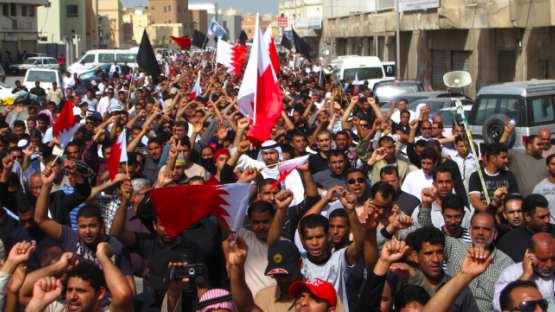Foreign companies complicit in Bahrain's human rights violations

Last week’s revelation that Bahraini human rights activists have been targeted by advanced surveillance technology made by British company Gamma is yet another nail in the coffin of privacy and freedom of expression in Bahrain.
Over the past ten years, Bahraini citizens, among the most internet-connected in the Middle East, have been subjected to increasingly oppressive controls on and intrusions into their online and offline lives. The internet is heavily patrolled, and free speech curtailed, by laws which prohibit the publication of material that is offensive to Islam or the king, or that are perceived as undermining state security or the monarchy. Content that is politically sensitive is censored, websites run by national and international non-governmental organisations are blocked, and bloggers, activists and movements are silenced. Moreover, a culture of self-censorship is pervading Bahrain as the government’s capacity for surveillance expands.
According to Nabeel Rajab, president of the Bahrain Centre for Human Rights, authorities have been conducting communications surveillance since at least the mid-2000s. Documents leaked by Salah Al-Bandar, a British citizen of Sudanese origin consulting for the Bahraini government, confirm that government officials were maintaining unlawful surveillance programmes to monitor opposition political parties and civil society organisations by 2006.
Since 2009, surveillance has become institutionalized, as all telecommunications providers have been required by law to gather and retain extensive information about users, and make that information available to security organs as requested. The Lawful Access Regulation 2009 was adopted by the Telecommunications Regulatory Authority – an ostensibly “independent” body responsible that is in fact headed by a Board of royal appointees – and mandated the collection and retention for one year of all communications data generated by users, including locations, numbers, dates, times, authentication usernames, IP addresses, and website addresses visited. Any government organ that is concerned with any national or international security matter is then entitled to demand access to that information as they see fit. The Regulation also requires telecommunication providers to adopt content surveillance capabilities into their systems and programmes, to enable security organs to intercept and monitor phone calls, text messages and internet usage.
While it is difficult to assess the spread of such surveillance practices, numerous stories and experiences confirm their use. Stories like that of Abdul Ghani Al Khanjar, a school administrator and activist who was detained for six months in August 2010 after speaking about human rights to a committee at the British House of Lords. Throughout his interrogation he was shown transcripts of text messages and phone calls dating back to 2009.
Driving and supporting the expansion of Bahraini surveillance capabilities is the global technology industry, which has shown no qualms at participating in the Bahraini government’s steady assault on privacy and expression rights. Many of the surveillance and censorship activities conducted by the Bahraini government take place at monitoring and surveillance centres supplied and run by foreign companies, such as Nokia Siemens. Much of the surveillance technology used in Bahrain is made by foreign companies like Gamma International, and US firms such as McAfee Inc. (acquired in 2011 by Intel Corp) and Blue Coat Systems have sold content-filtering software and hardware respectively to internet service providers in Bahrain. Privacy International has published a briefing on surveillance in Bahrain which sets these arrangements out in more detail.
The British government has been repeatedly requested to impose tougher export restrictions to halt the flow of surveillance technologies from British companies to human rights violators like Bahrain, Egypt and Turkmenistan, all of which number among Gamma’s customers. Two weeks ago, Privacy International wrote to the government indicating that legal action will be commenced if swift and effective steps are not taken immediately to curtail these practices.
The walls are closing in on the Bahraini people, as their government gradually expands its power and capacity to watch and control the people. With internal dissent and public discourse stifled, criticism and calls for change must come from the international community. But what legitimacy can we expect the Bahraini government accord to the critiques of other states, when those same states are complicit in providing them with the means to violate human rights?



